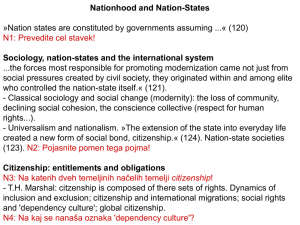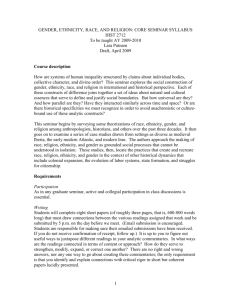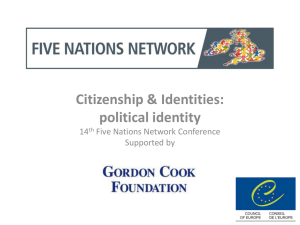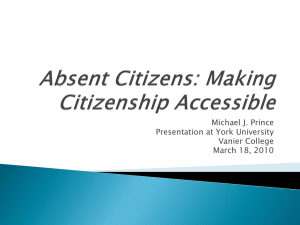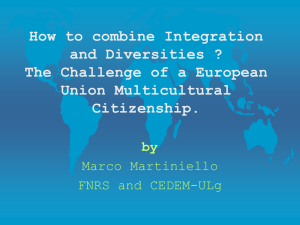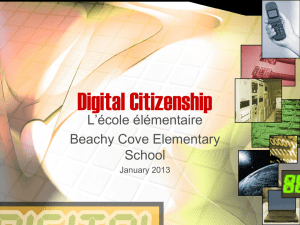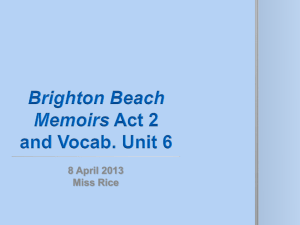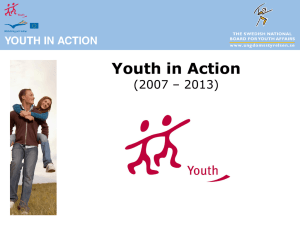week 5 identity and the family_Re Af Ams and As Ams
advertisement
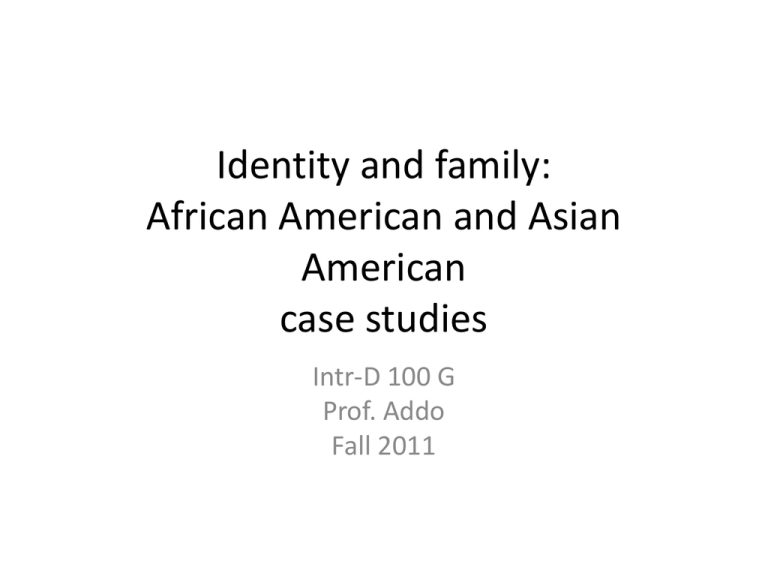
Identity and family: African American and Asian American case studies Intr-D 100 G Prof. Addo Fall 2011 Identity • Definition: the categories and characteristics of people as a members of particular groups. These groups may be distinguished by their ethnicity, “race,” class, gender, sexuality, language, occupation/ regular defining activity or any other marker that sets them apart from other groups in society. Identity • Is private – how do I categorize myself in terms of a group to which I have affinity? • Is public – how does others categorize me? • Does any of this matter? Shouldn’t what I think of myself matter the most? • Answer= yes, but no… In any society • Our identity (who we are) is a combination of private and public assumptions • E.g. W.E.B. DuBois’s idea of doubleconsciousness: “this sense of always looking at one’s self through the eyes of others”….and “one ever feels his two-ness – an American and a Negro; two souls, two thoughts, two reconciled strivings; two warring ideals in one dark body…”(Du Bois 1903 [2003]:7). Jesse Tauriac’s lecture (Oct 3) • Ascribed Identity OR Socially-assigned Identity = how others thinks about us or what groups they place us in Vs • Claimed identity = how we think about ourselves; what group we claim as our “peeps” b/c they have similar experiences to us Jesse Tauriac’s lecture (Oct 3) • He asked 3 Q’s: 1. When you are out in a public context, what identity do people place you in (in other words, what are your ascribed identities)? 2. What is your claimed identity? 3. If 1 and 2 (above) are different, how does this affect your academic experience? Issues raised by Ugwu-Oju “What would My Mother Say?” (2001) • Aspects of Local history in the hostland are not always understood by diasporans • Eg: Racism was not part of Ugwu-Oju’s experience, • but remember the film (“Neo-African Americans”) Racism is a part of second and third generation African immigrants’ experience How to talk about the differences in what the Af Am/Black girls felt and what Ugwu-Oju felt? • Answer = Ethnicity – the combination of claimed and ascribed identity that takes into account people’s history, culture, and self-definitions…. • Ethnicity is NOT THE SAME as Race • Race = category that is based on phenotype only • An Ethnic Category is more nuanced (eg; Ibo and Hausa; Caribbean; Jamaican; Continental African)….All are racially of African descent, but different in terms of ethnicity Ugwu-Oju (2001:67) • Institutionalized racism = societal patterns that have the net effect of imposing oppressive or otherwise negative conditions against identifiable groups on the basis of race or ethnicity. • Internalized racism = when people targeted by racism are, against their will, coerced and pressured to agree with the distortions of racism…sometimes come to hate one’s own “group” … but what if one does not identify as part of that group?? And what makes one able to identify over time?? Assimilation, ethnicity, and race • What do you learn from Jesse’s guest lecture that help you explain the differences in outcomes between American Blacks and Immigrant Africans and Caribbean people? • Note that the reading by Tormala and Deaux (2006) presents similar ideas Relationship between diaspora and family • People who immigrate or retain ties are usually related to SOMEONE “back home” Their identities are not as single people, but as members of families Sometimes families are “far flung” But individuals are still a family Sometimes family groups are multi-territorial Sometimes social borders defy national borders (Yanagisako 1995:291) NATION (see Anderson article, 1983, from week 2) • Nation = a political community that is imagined as inherently limited and sovereign (Anderson 1991 [1983]:6) • “The nations is always conceived as a deep horizontal comradeship” (ibid.:7) • NATIONALISM = allegiance to such a community; the community does not have to be in one geographical space; members are not necessarily co-ethnics TRANSNATIONALISM • Nationalistic groups formed between people • The groups are not located in one single place; • Transnational groups are seen as an indication of a sign of the strengthening of interconnectivity between people • Transnational groups are seen as an indication of a sign of the weakening of boundaries between political countries/nations Transnational Identity • Involves Have a decentered consciousness (Ong 1993:742) What does she mean by this? Is her idea the same as Du Bois’s idea of the Double Consciousness of African Americans? Citizenship • The state of belonging to a group • (modern) National citizenship – regulated by passports • Cultural citizenship – regulated by others in the group a kind of ascribed identity Citizenship • Overseas citizenship – having national citizenship in one country while living in another Ong says this is constrained for Chinese immigrants from Hong Kong • The Law in a country also controls our identities. • SO…IDENTITY is controlled by: Family/ group; Self; and Law/nation Long-Distance and Local family: Asian Americans as case studies in identity and citizenship • Presentation by Asmae, Vanessa, and Jason (postponed to Wed Oct 12, 2011) Paper # 1 also due on Oct 12, at start of class.
